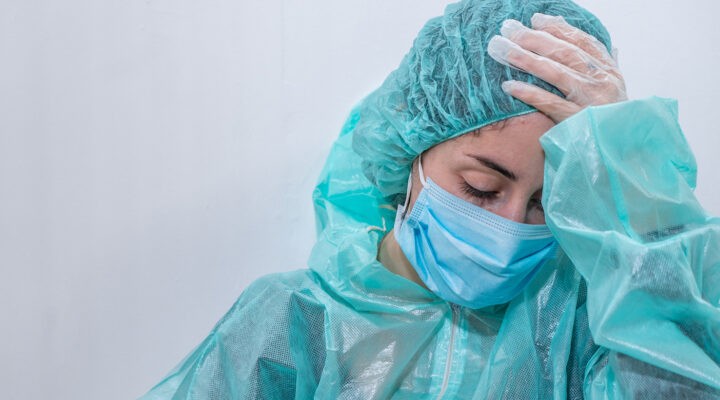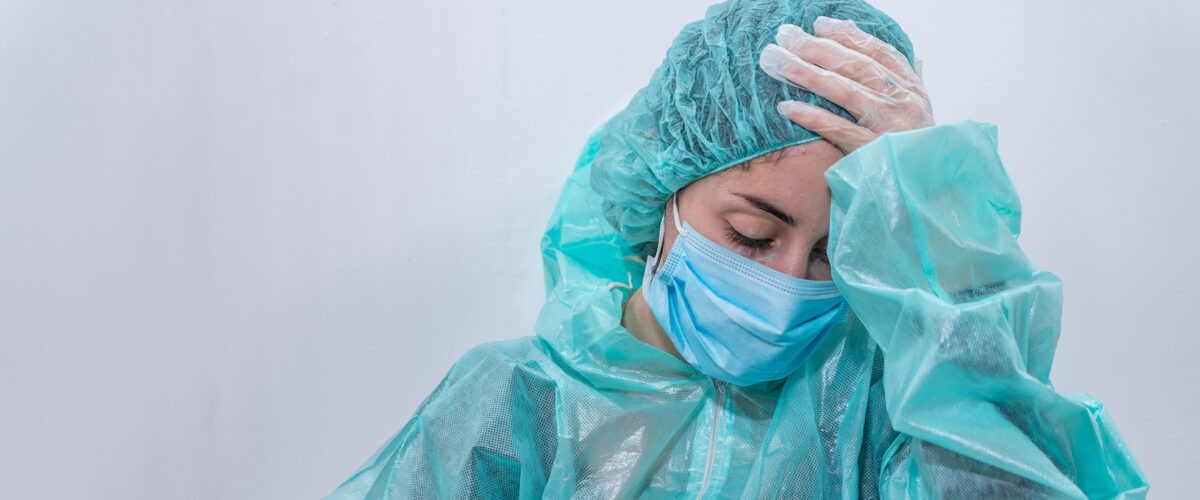After nearly two years of largely favoring the free-exercise-of-religion claims brought by conservative Christians during the COVID-19 pandemic, the United States Supreme Court drew a firm line against such claims Dec. 13.
Presented with a request for an emergency injunction to stop the state of New York from mandating that health care workers be vaccinated — with no religious exemptions available — the high court agreed with New York that such exemptions are not required.
Six of the court’s nine justices joined in denying the request of a group of medical providers who have refused vaccination on religious grounds, even though no major religious body in the nation has put forward a theological objection to the COVID vaccines. However, three of the court’s most conservative justices dissented and said the health care workers should be allowed a religious exemption that would prevent them from being fired.
In brief, the assortment of New York medical personnel who filed suit against the state to demand religious exemptions to the vaccine mandate claimed the state’s policy is “extraordinarily punitive” and a targeted punishment of people of faith.
New York’s vaccine mandate — intended to stop the spread of the global pandemic and ensure the safety of all health care workers and their patients — does allow exemptions for documented medical cases but not for religious objectors.
New York’s vaccine mandate — intended to stop the spread of the global pandemic and ensure the safety of all health care workers and their patients — does allow exemptions for documented medical cases but not for religious objectors.
Nationwide, COVID vaccine deniers — largely fueled by debunked conspiracy theories perpetuated by right-wing groups online — have sought religious exemptions to vaccine mandates. Previous research has shown the majority of such claims are not, in fact, religiously motivated but are politically or ideologically motivated.
The Catholic Church has declared the vaccines acceptable and necessary and not a violation of its anti-abortion doctrines. False claims that all available COVID vaccines are derived from cells of aborted fetuses are the primary, but not the only, source of religious objection to the vaccines.
The Supreme Court’s majority simply noted denial of the request to stop the New York vaccine mandate without elaboration. The three dissenting justices wrote a 14-page explanation of their beliefs. That dissent was authored by Justice Neil Gorsuch and joined by Justices Clarence Thomas and Samuel Alito.
Chief among the reasons for siding with the 20 plaintiffs in the case, the document says, is this: “These applicants are not ‘anti-vaxxers’ who object to all vaccines. Instead, the applicants explain, they cannot receive a COVID–19 vaccine because their religion teaches them to oppose abortion in any form, and because each of the currently available vaccines has depended upon abortion-derived fetal cell lines in its production or testing.”
The key line to this interpretation is “production or testing.” While some vaccines are developed using “immortal” cells derived from fetal tissue 50 years ago — something the Catholic Church does not oppose in the vaccines — many pharmaceuticals are tested with methods that involve those historic cell lines. In some cases, governments and employers have required those claiming a religious objection to COVID vaccine to verify that they also object to and refrain from using the wide variety of drugs also tested in this manner.
The Supreme Court’s Dec. 13 ruling is notable on religious liberty grounds because it prioritizes public health over a small group of citizens’ sincerely held religious beliefs.
The Supreme Court’s Dec. 13 ruling is notable on religious liberty grounds because it prioritizes public health over a small group of citizens’ sincerely held religious beliefs. Earlier in the pandemic, the court with its current conservative majority sided with churches that defied public health mandates against gathering indoors in large groups — claiming their religious practice was being wrongly impinged by the government’s attempts to stop the spread of a deadly disease.
The Supreme Court currently faces multiple other requests for emergency injunctions to stop vaccine mandates in schools and workplaces, including from those protesting President Joe Biden’s mandate that all U.S. employers with more than 100 employees must require vaccination.
How the Dec. 13 ruling might affect those cases is not yet clear, as some of the claims turn on slightly different nuances that are not related exclusively to religious exemptions.
Rachel Laser, president of Americans United for Separation of Church and State, praised the court’s decision as upholding true religious liberty.
“The Supreme Court’s orders — the second and third in recent months rejecting requests to block a state’s vaccination requirements — honor our country’s constitutional principle of church-state separation, which protects religious freedom for everyone and ensures we are all treated equally under the law,” she said. “Religious freedom is not a right to risk other people’s lives during a global pandemic that has already killed nearly 800,000 people in the U.S. These orders are in line with more than a century of court decisions that make clear the Constitution does not mandate religious exemptions from vaccination requirements.”
Becket Law, the conservative political and religious firm representing the plaintiffs in this case, has not yet issued a statement on the ruling.
Related articles:
Conversation growing about COVID vaccine ‘religious exemptions’
Looking for a religious exemption to a COVID vaccine mandate? Most denominations won’t help you


